
|
July 17, 2017 - No. 25 Supplement Culmination of
Mass Discussion • Report on Analysis of Documents
of 7th Congress Extraordinary Session of Cuba's National Assembly of People's Power Culmination of Mass Discussion on Conceptualization of the Cuban Economic and Social Model
Cuba's National Assembly of People's Power held an extraordinary session from May 31 to June 1 following a mass discussion throughout the country on the conceptualization of Cuba's economic and social model. Deputies of the National Assembly were organized into four commissions and discussed documents on: 1. Conceptualization of the Cuban Economic and Social Model of Socialist Development 2. Economic and Social Policy Guidelines of the Party and the Revolution for the period 2016-2021 The documents were the result of a discussion that began at the 7th Congress of the Communist Party of Cuba in April 2016. Since that time, 47,470 meetings were held involving 1,600,000 Cubans, during which 718,229 comments were submitted, through which the documents were strengthened. Arelis Santana Bello, Chair of the National Assembly Commission on Youth, Children and Women's Equal Rights presented the report on the May 31 session. Among the many points raised, deputies discussed the issue of the possibility of the concentration of property or wealth, and how to ensure it is regulated in a way that does not contradict the principles of Cuban socialism. The National Assembly recommended that the condition be created "for effective regulation of the levels of concentration of property and wealth." Also discussed was the "importance of popular control in the Enterprise System, owned by all the people, as well as in the other spheres of society" and ensuring this is properly reflected in the conceptualization of Cuba's economy. The deputies in the four commissions approved the documents and authorized their submission to a style review before their final issuing and publication. The second day, June 1 was presided over by the President of Cuba's Councils of State and Ministers and First Secretary of the Communist Party of Cuba Central Committee, Raúl Castro. Reviewing the various stages of discussion which took place on the conceptualization of Cuba's economic and social model since the 6th Congress of the Communist Party of Cuba in April 2011 up to this point, Raúl said that the documents considered were the most analyzed and debated in the history of the Revolution. Deputies reviewed proposals for Cuba's National Social and Economic Development Plan through 2030, which will be finalized at a December 2018 sitting. Cuba's National Assembly reconvened July 10 to 14 to consider other important matters, including analysis of progress made on the National Economic Plan during the first half of the year.
The National Assembly reaffirmed their support and solidarity with the Bolivarian Revolution and the Venezuelan People and government on July 12. During the June 1 sitting, deputies approved a declaration giving the National Assembly's "firmest and resolute support to the sister Bolivarian Republic of Venezuela, to her legitimate government and to the civic-military union headed by constitutional President Nicolás Maduro Moros, facing a serious escalation of domestic violence and international intervention."
On July 11, the International Relations Commission released a statement in support of the declaration issued June 16 by the Revolutionary government regarding the U.S. President's new Cuba policy. The statement reaffirmed that "No one can set standards for the Cuban people. We will never accept any impositions regarding norms of conduct or views about our democracy or the inner workings of our economic, political and social system."
TML Weekly congratulates the Cuban people and leadership on their broad and successful discussion that reaffirms the socialist character of the Revolution and the role of the Party as the leading force of society and the state. It will no doubt further strengthen the Cuban people's unity around the kind of society and economy they are building for themselves. TML Weekly is publishing below reports and remarks from this discussion and the extraordinary session of the National Assembly of People's Power. Further information on Cuba's renewal of its economic model will be published in future issues. Report on Analysis of Documents of 7th Congress
|
|
|
This is what Raúl said upon closing the 7th Party Congress, April 19, 2016, and this is what has happened. Just a few days ago, May 19, members of the Central Committee meeting in the third plenum of their term, approved the three documents guiding the updating of our socio-economic model: the Conceptualization of the Cuban Economic and Social Model of Socialist Development; the foundations for the Social and Economic Development Plan through 2030: Vision of the Nation, Axes, and Strategic Sectors; as well as new modifications to the Economic and Social Policy Guidelines of the Party and the Revolution.
Reaching this point comes as the result of an arduous effort that began even before the April 2016 Congress, characterized by a broad process of popular consultation in which more than 1.6 million Cubans participated, among them rank and file members of the Communist Party of Cuba (PCC) and the Communist Youth Union (UJC); representatives of mass organizations; as well as broad sectors of society.
Let us briefly review the democratic, participatory route these documents followed, to appreciate the dimensions of the effort undertaken by the Party and the Revolution with the people. Work on these documents began practically as soon as the 6th Party Congress concluded. They were debated in two Central Committee plenums (December of 2015 and January of 2016), during which 900 opinions were contributed, leading to new versions which were submitted to the 1,000 delegates elected to the 7th Congress and 3,500 invited guests, in meetings held in all provinces, with all deputies to the National Assembly of People's Power as well. By the beginning of March, 2016, these meetings had generated more than 8,880 comments and proposals.
 One revealing fact
about the discussion sheds light on the seriousness with which
the documents were treated. Before April, 2016, eight versions
had already been drafted of the Conceptualization, a topic which
for the first time was to be considered at a Party Congress. The
same occurred with the National Development Plan through 2030, a
complicated subject which could not be fully addressed before the
7th Congress. Thus the decision was made to consider the
"foundations" for this plan, that is the Vision of the Nation,
Axes, and Strategic Sectors, which Raúl described as "a
formidable tool to continue working on until its conclusion,
which we hope to reach in 2017." This foundational document that
was presented and discussed required the efforts of academics and
specialists from government bodies, as well as that of the
Implementation and Development Permanent Commission, working on
the Policy Guidelines.
One revealing fact
about the discussion sheds light on the seriousness with which
the documents were treated. Before April, 2016, eight versions
had already been drafted of the Conceptualization, a topic which
for the first time was to be considered at a Party Congress. The
same occurred with the National Development Plan through 2030, a
complicated subject which could not be fully addressed before the
7th Congress. Thus the decision was made to consider the
"foundations" for this plan, that is the Vision of the Nation,
Axes, and Strategic Sectors, which Raúl described as "a
formidable tool to continue working on until its conclusion,
which we hope to reach in 2017." This foundational document that
was presented and discussed required the efforts of academics and
specialists from government bodies, as well as that of the
Implementation and Development Permanent Commission, working on
the Policy Guidelines.
It should be recalled that these were not the only documents considered during the pre-Congress discussion of March 2016 and the 7th Congress. Additionally debated and put to a vote were a summary of the economy's performance during the five-year period 2011-2015, as well as a report on progress made in the implementation of the Party and the Revolution's Economic and Social Policy Guidelines; along with an updating of the Guidelines for the period 2016-2021, and a report on the Party's efforts to meet objectives approved by the First Party Conference and directives of the Central Committee Secretariat. These four documents are closely linked and reflect a dynamic vision which is in no way static or complete.
On April 19, 2016, when delegates left the Convention Center, the 7th Party Congress had not ended. This was rather the very instant it was truly beginning, revitalized and stronger, within the Party's most important auditorium: the halls of the people. Delegates had voted to have the Conceptualization and the foundations for the Development Plan through 2030 debated by the ranks and broad sectors of the population, between June 20 and September 20 of the year.
|
|
During this exercise of true democracy, 47,470 meetings were held. Of these, 91 per cent (43,525) took place at the local level, with the participation of more than 1.6 million people. Some 718,229 comments were made and 208,161 proposals presented, of which 203,015 were received. The Center for Opinion and Socio-political Studies (CESPO), along with the Implementation and Development Permanent Commission, were responsible for processing the results of the consultation. They decided not to transmit 5,146 proposals which referred to composition and style issues without addressing content, or which had nothing to do with topics included in the documents, as well as some that dealt with very specific questions relevant to a particular entity.
A significant number of proposals were combined given their similarity, to produce a total of 48,320, organized in categories as modifications, additions, eliminations, or doubts. Some 36,426 modifications were identified, representing 75 per cent of the total; 8,623 (18 per cent) were considered doubts; while 451 eliminations (1 per cent) and 2,820 additions (6 per cent) were proposed. The Conceptualization of Cuba's Socio-economic Model elicited the greatest number of proposals, with a total of 34,991, while 13,329 regarding the National Development Plan through 2030 were made.
The Party Political Bureau created a committee to supervise the implementation of agreements reached at the 7th Congress, which evaluated the results of the consultation and drafted new versions of the documents, which were submitted to a group of academics, who along with other experts expressed their opinions and generated more than 1,000 additional proposals to be considered. It was on this basis that the documents were again rewritten and the updating of the Policy Guidelines added.
As the Central Committee plenum held this past May 19 indicated, it is now the National Assembly of People's Power which will consider for approval the Conceptualization and Guidelines documents. Deputies will also receive information about the process of developing the foundations for the National Development Plan through 2030. President Raúl Castro was absolutely right when he said, during the 3rd Plenum, that these texts were "the most studied, discussed, and re-discussed in the history of the Revolution."
(Granma, May 31, 2017)
An Exercise That Has Reaffirmed the Thinking Capacity of Our People
Miguel Díaz-Canel Bermúdez, member of the Party Political Bureau and first vice president of the Councils of State and Ministers, spoke to Granma regarding the discussion of the documents stemming from the 7th Party Congress.
***
In statements to Granma, Miguel Díaz-Canel Bermúdez affirmed that the discussion of the documents stemming from the 7th Party Congress in the extraordinary session of the National Assembly for People's Power, forms part of a process that exemplifies the concepts of democratic participation and social responsibility in Cuba.
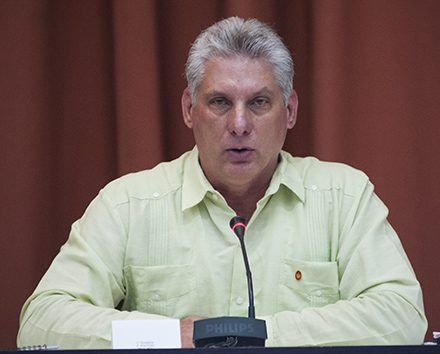 "We
cannot separate what has been happening here in the National
Assembly today from a process that was conceived even before the
Party Congress," he stated.
"We
cannot separate what has been happening here in the National
Assembly today from a process that was conceived even before the
Party Congress," he stated.
He recalled that prior to the 7th Party Congress, a commission worked with sector specialists and leaders on the fundamental ideas and content of each of these documents. A wide range of proposals were made during the debate held prior to the Congress, such that the documents finally presented were significantly stronger, better elaborated texts, with a superior content to the original drafts, Díaz-Canel explained.
"But we did not stop there, as in the Party Congress itself there was a broad debate about these documents and a group of modifications were introduced to the texts which were put to the process of popular consultation in which more than 1.6 million people took part in more than 47,000 meetings; and with all the proposals, the content of the documents was reconsidered," he added.
Likewise, the first vice president noted that the texts were also discussed in several meetings of the Party's leadership and, later in April, were analyzed by deputies and members of the Central Committee. This resulted in a series of proposals that were again submitted to consultation with specialists in economics, social issues and other topics relating to the documents, before they were presented to the Third Central Committee Plenum.
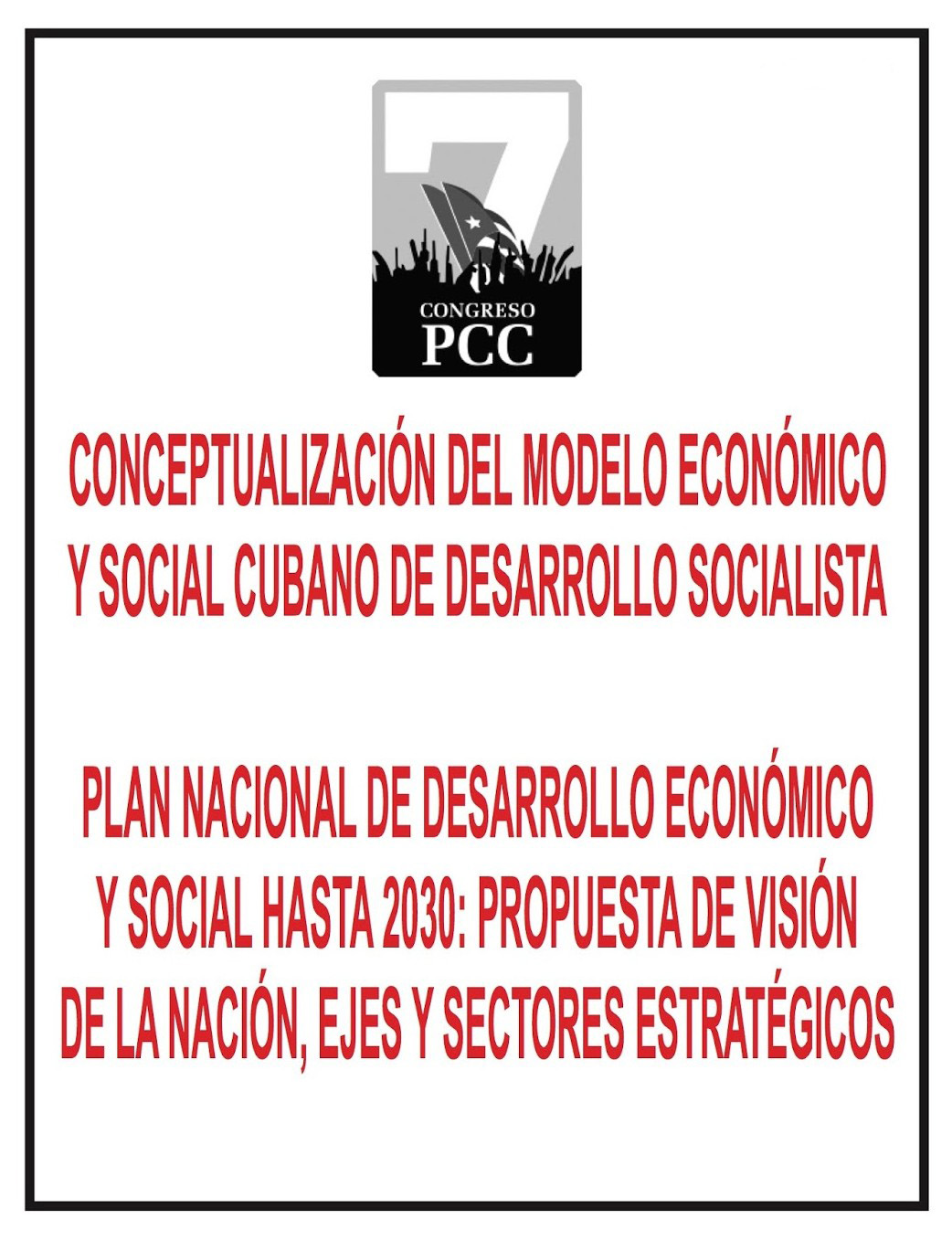 "Now we bring them to the Assembly once again; as
such, a large number of deputies have participated in several of
these moments, taking on what they have contributed and what they
have recognized from the contributions of the rest of the
population that has participated in the debate. It is an exercise
of our society, which has reaffirmed the thinking capacity that
exists among our people. In the various consultations, one is
surprised how, in documents that have been so thoroughly revised
and expanded, the people always make new proposals, which are
intelligent and contribute," he explained.
"Now we bring them to the Assembly once again; as
such, a large number of deputies have participated in several of
these moments, taking on what they have contributed and what they
have recognized from the contributions of the rest of the
population that has participated in the debate. It is an exercise
of our society, which has reaffirmed the thinking capacity that
exists among our people. In the various consultations, one is
surprised how, in documents that have been so thoroughly revised
and expanded, the people always make new proposals, which are
intelligent and contribute," he explained.
"I am convinced that the documents we have endorsed in this commission number 3, which I am convinced will be supported in the plenary session tomorrow, are perfected, more robust documents... They are guiding documents for the present and future of the country."
Díaz-Canel emphasized that there will be ongoing perfection, "because we are talking about issues of great commitment, and any view, review and the very practice and implementation in the current conditions will pose new modifications and improvements."
"This process demonstrates unity, responsibility, participation and the commitment of our people to the present and future of the country. They are dense, complex documents and there was an extraordinary personal and collective participation. It is also one of the things that fills you with the pride of being Cuban," the first vice president concluded.
Speech of Cuban President Raúl Castro
TML Weekly is publishing below the speech presented June 1 by Army General Raúl Castro Ruz, first secretary of the Communist Party of Cuba Central Committee, and President of the Councils of State and Ministers, during the Second Extraordinary Session of the 8th legislature of the National Assembly of People's Power.
***
Dear comrades:
I will only present a few words, given the extraordinary nature of this Assembly, convoked by the Council of State to analyze far-reaching, complex documents, which as we stated in our principal report to the 7th Party Congress, set the course of the Cuban revolutionary process, that of the Party and society, toward the future in the construction of our socialism.
We refer, first of all, to the Conceptualization of the Cuban Economic and Social Model of Socialist Development.
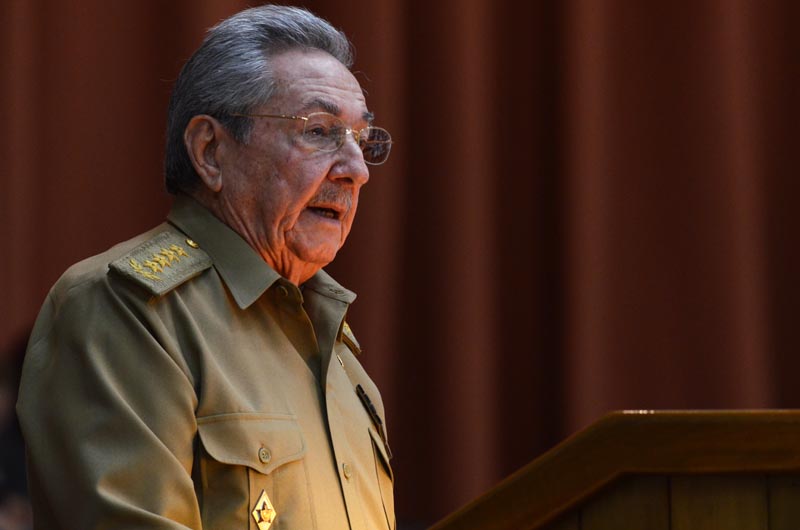
Also on this occasion, the National Assembly of People's Power, as it did in July of last year, supported the spirit and letter of the updating of the Economic and Social Policy Guidelines of the Party and the Revolution for the period 2016-2021, approved by the 7th Party Congress, which now include opinions expressed after that date.
The National Assembly also heard results of the process of discussion on the foundations for the National Economic and Social Development Plan through 2030, on the basis of which this plan will be crafted, which we will submit for approval to this legislature in December of 2018.
The elaboration of these three documents was based on their antecedents, the resolutions approved by the 6th Party Congress in 2011. Since then several versions have been written which were submitted to the consideration of the Political Bureau for their presentation to the 7th Party Congress.
Previously, a consultation had taken place in every province with 971 Congress delegates and 3,617 guests, during which 1,345 proposals were generated, allowing some concepts to be clarified and foundations broadened.
The 7th Party Congress, given its positive reception of the documents presented, agreed to initiate a broad, democratic debate on the Conceptualization of the Cuban Economic and Social Model of Socialist Development and the foundations for the National Economic and Social Development Plan through 2030, with all members of the Party and the Young Communist League, representatives of mass organizations and diverse sectors of society, as well as taking into consideration results of the consultation conducted to adjust the Guidelines as needed.
In accordance with this agreement, 47,470 meetings were held in which more than 1.6 million Cubans participated, generating 208,161 proposals and leading to the modification of a significant part of the original content or wording of the documents.
This activity, which demonstrated the preparation of those participating in addition to allowing for the perfecting of the aforementioned documents, constituted an important opportunity for the exercise of popular participation in the debate and the decisions made. It also served as an effective means of communication and generalization of the fundamental changes proposed for the updating of our model, and showed support for the economic and social policies of the Party and the Revolution approved during the 6th Congress.
The new versions, products of this process, were debated by members of the Central Committee and deputies in their respective provinces, and their proposals were analyzed in the 3rd Central Committee Plenum, the body which approved, in accordance with the authority granted by the 7th Congress, the Conceptualization of the Cuban Economic and Social Model of Socialist Development and the foundations for the National Economic and Social Development Plan through 2030, as well as new modifications to the Economic and Social Policy Guidelines of the Party and the Revolution for the period 2016-2021, while agreeing to submit to the consideration of the National Assembly the documents we have analyzed during this extraordinary session.
This brief but necessary summary allows me to reaffirm today what I said this past May 18, during the 3rd Central Committee Plenum, that "These documents are the most studied, discussed, and re-discussed in the history of the Revolution," and perhaps in the history of the Republic of Cuba.
These programmatic fundamentals, approved recently by the Party Central Committee and now backed by the National Assembly of People's Power, reaffirm the socialist character of the Cuban Revolution and the role of the Communist Party as the paramount leading force of society and the state, as is established, with absolute clarity, in Article 5 of the Constitution of the Republic.
This permits us to continue advancing in the updating of our social and economic model, which is the same as "changing everything that must be changed," and we will do so at the pace which allows us to develop the consensus we are forging within our society, and the ability we show to do things well, to avoid serious mistakes which can compromise the successful accomplishment of this immense, honorable task.
In this very session, in representation of the genuine will of our people, the Cuban Parliament approved a declaration of support to the people and government of the Bolivarian Republic of Venezuela.
On this issue, I would like to emphasize that it is necessary to denounce and stop the aggression against this sister country. Imperialist economic and political interests are attempting to deny its people the right to exercise self-determination. Joining the unilateral, arbitrary and unjust sanctions of the United States, are intervention in internal affairs by the OAS and various governments, as well as defamation and crude manipulation of reality -- all directed toward overthrowing the constitutional government elected by Venezuelans.
Many of those leading protests and seeking international recognition are the same individuals who were involved in the 2002 military coup, in the oil sabotage of 2003, and in the violent, seditious actions of 2014.
A hypocritical attempt is made to justify foreign intervention, claiming that they want to help the Venezuelan people, but the only way to do so is by demonstrating in action full respect for the sovereignty of Venezuela and encouraging constructive, respectful dialogue, as the only means to address disagreements.
If in reality there is concern for human rights and personal security, the pro-coup violence which has caused death and injury must be unequivocally condemned. Images of youth being hit, punched, and burned alive by violent oppositionists remind us of the worse acts of fascism.
I reiterate our solidarity with the Bolivarian Chavista Revolution, with the civic-military union of the Venezuelan people, and with the government led by constitutional President Nicolás Maduro Moros.
We also note with concern the development of events in Brazil, a consequence of the methods with which Comrade Dilma Rousseff was removed from the Presidency, and with which the Workers' Party and its historic leader, Comrade Luiz Inácio Lula da Silva, are being persecuted.
We are convinced that only respect for the sovereign will and mandate of the people will return legitimacy to the political system in this sister country.
In this struggle, the Brazilian people have, and will have, Cuba's full solidarity.
Comrades:
Before concluding, I would like to tell the deputies and our entire people that, as we traditionally do in every ordinary session of this Assembly, this coming month of July, we will address other questions of national and international relevance.
Thank you very much. [Applause]Website: www.cpcml.ca Email: editor@cpcml.ca
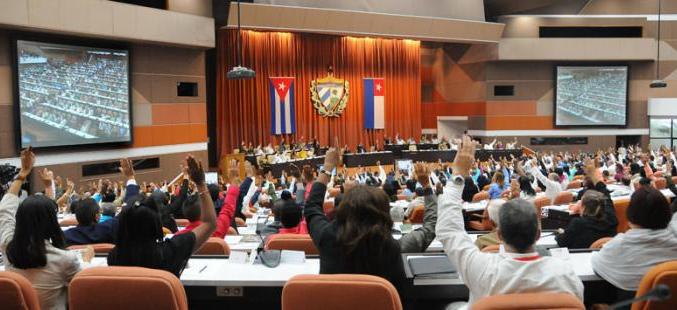
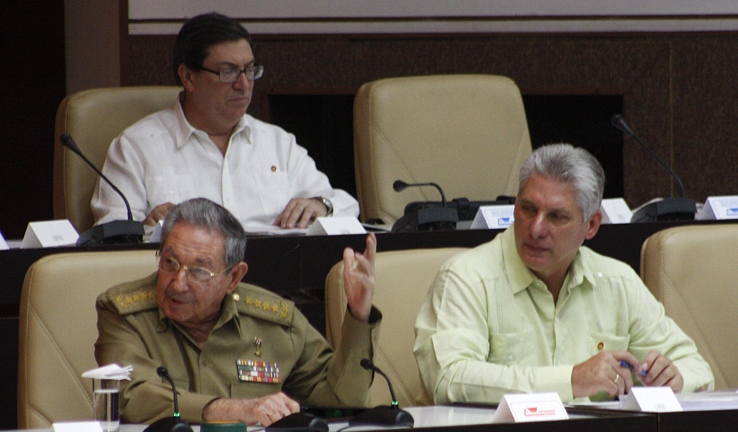 Cuban President Raúl Castro at the
Extraordinary Session of the National Assembly of People's Power.
Vice President Miguel Díaz-Canel Bermúdez is to the
right and behind is Foreign Minister Bruno Rodríguez
Parilla.
Cuban President Raúl Castro at the
Extraordinary Session of the National Assembly of People's Power.
Vice President Miguel Díaz-Canel Bermúdez is to the
right and behind is Foreign Minister Bruno Rodríguez
Parilla.
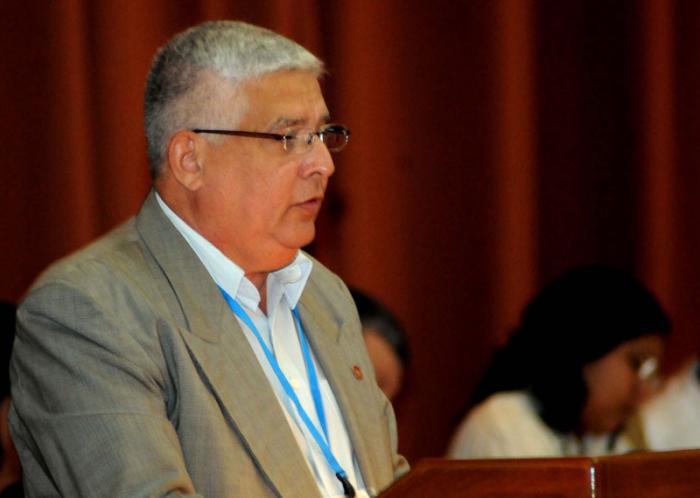
 Cuban President Raúl Castro,
with the late Fidel Castro, closes the proceedings of the
Communist Party of Cuba's 7th Congress, April 19, 2016.
Cuban President Raúl Castro,
with the late Fidel Castro, closes the proceedings of the
Communist Party of Cuba's 7th Congress, April 19, 2016. 